In the fast-paced world of events, transportation is more than just moving people from one point to another—it is about delivering seamless, efficient, and memorable VIP transportation services. As technology evolves, artificial intelligence (AI) is emerging as a transformative force reshaping event transportation management. From predictive analytics to real-time monitoring, AI is unlocking new possibilities that redefine how event logistics are planned, executed, and optimized.
Challenges in Traditional Event Transportation
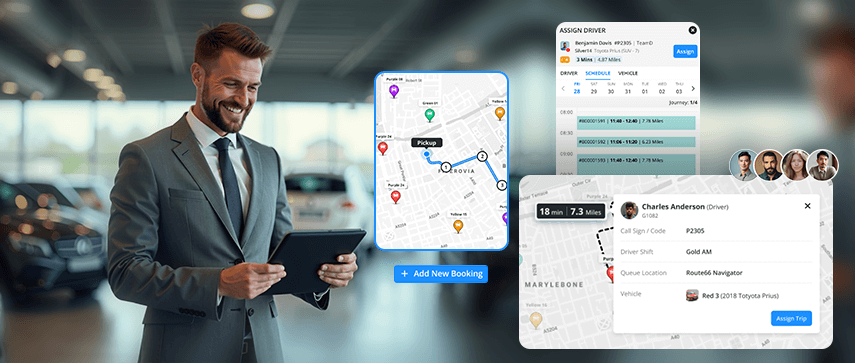
Managing transportation for events, especially large-scale ones, comes with its unique challenges:
- Complex Logistics: Coordinating transport for attendees, VIPs, athletes, and staff often involves intricate scheduling. VIP transportation management software is essential to managing multiple arrival waves, security protocols, and varying service requirements. The complexity multiplies when dealing with international events where flight schedules can change unexpectedly, or when managing multiple venues with different access restrictions and security clearances.
- Last-Minute Changes: Unforeseen delays or changes in plans can cause chaos in traditional systems. Weather disruptions, flight delays, or sudden schedule changes can trigger a domino effect across the entire transportation network. Event logistics software provides real-time updates and flexibility to handle these disruptions efficiently, allowing for dynamic route adjustments.
- Lack of Real-Time Insights: Traditional systems often operate reactively, leaving operators blind to developing situations. Manual tracking methods create information gaps between different stakeholders - drivers, dispatchers, and event coordinators. With VIP transportation software, real-time visibility into vehicle locations, traffic conditions, and guest status is made possible, allowing for proactive decision-making.
- Inefficient Resource Allocation: Poorly planned transport leads to underutilized vehicles and increased costs. Traditional scheduling methods often result in vehicles sitting idle during off-peak times while being insufficient during peak demands. With AI-driven solutions, operators can make more informed decisions to optimize vehicle fleet distribution, ensuring better resource allocation through advanced algorithms.
- Communication Gaps: Traditional communication channels between drivers, dispatchers, and guests rely heavily on manual intervention. Chauffeur service software and AI technologies provide a centralized communication platform, eliminating confusion and miscommunication while ensuring a consistent level of service.
- Security Coordination: Managing security requirements for different VIP categories becomes exponentially complex in traditional systems. Luxury transportation management software integrates security protocols with transportation schedules, providing seamless coordination and secure mobility.
AI addresses these issues head-on, offering intelligent solutions tailored to the dynamic needs of event transportation. AI transforms these challenges into manageable processes through advanced algorithms and real-time data processing, ensuring smooth and efficient event transportation operations.

AI-Powered Innovations Shaping Event Transportation
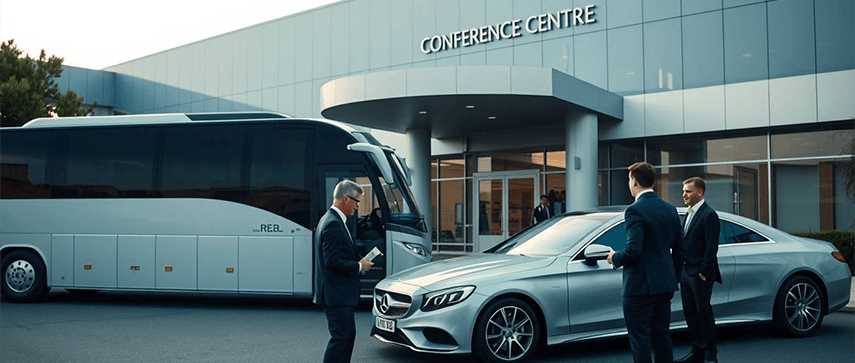
AI is revolutionizing the way transportation is managed at events, offering cutting-edge solutions to optimize operations, enhance guest experiences, and promote sustainability. Here are the key AI-powered innovations transforming event transportation services:
1. Predictive Analytics for Accurate Demand Forecasting
AI algorithms analyze historical data, ticket sales, and real-time patterns to accurately forecast transportation needs. By processing multiple data points such as past event attendance, ticket scanning data, and even social media engagement, the system anticipates demand levels with remarkable precision. Machine learning models refine these predictions by incorporating weather forecasts, local event calendars, and real-time traffic data, enabling event organizers to optimize vehicle fleets and reduce costs while maintaining high-quality service.
2. Dynamic Routing and Scheduling
AI-powered systems adapt to real-time changes like traffic conditions, weather updates, or unexpected delays. The platform continuously monitors data from traffic cameras, weather satellites, and road closure alerts, recalculating optimal routes automatically. In the event of a disruption, the system generates alternative routes that factor in VIP security, vehicle capabilities, and guest preferences, ensuring attendees arrive on time with minimal disruptions. This dynamic routing approach enhances event logistics and guarantees smooth event transportation, even during unforeseen circumstances.
3. Smart Allocation of Resources
AI optimizes the allocation of vehicles, drivers, and staff for maximum operational efficiency. By analyzing usage patterns in real time, the system considers various factors, such as driver expertise, vehicle specifications, and client preferences. AI systems predict peak demand periods and automatically adjust resource distribution accordingly. Additionally, driver rest requirements, vehicle maintenance schedules, and fuel efficiency metrics are considered to ensure balanced resource deployment, minimizing overbooking and resource wastage.
4. Enhanced Passenger Experience
AI-driven chatbots and virtual assistants provide attendees with real-time updates, personalized travel itineraries, and instant support, ensuring a smooth and enjoyable experience. These intelligent systems communicate in multiple languages, understand context-specific requests, and offer tailored recommendations based on guest profiles. By maintaining constant communication with vehicles and event venues, AI tools provide guests with precise arrival times, gate information, and weather advisories. This personalized approach enhances convenience, satisfaction, and overall guest experience at events.
5. Predictive Maintenance
AI detects potential issues in vehicles before they escalate, reducing downtime and ensuring a reliable transportation fleet during events. Advanced sensor networks continuously monitor critical vehicle systems, from engine performance to tire pressure. Machine learning algorithms analyze this data against historical maintenance records to identify patterns that might indicate future problems. The system automatically schedules maintenance interventions during off-peak periods, ensuring maximum vehicle availability during critical event times.
6. Integration with Smart Infrastructure
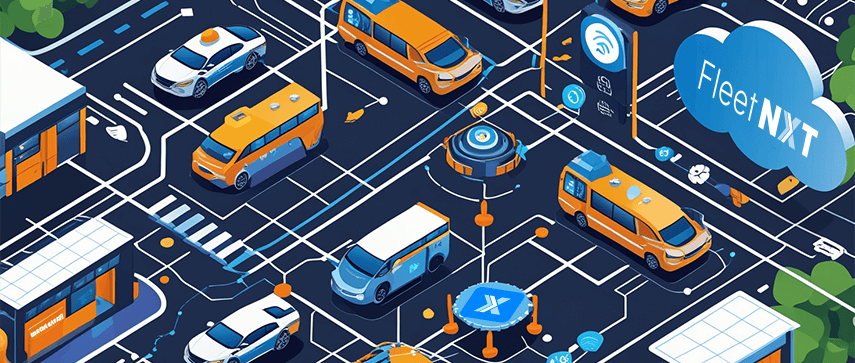
AI-powered transportation systems seamlessly integrate with smart infrastructure elements like smart parking solutions, automated check-ins, and crowd management tools. The platform exchanges real-time data with venue management systems, security checkpoints, and environmental controls, optimizing the entire guest journey. Integration with traffic signals, parking allocation systems, and security staffing ensures the smooth flow of guests and reduces confusion, particularly in large or complex venues. This smart infrastructure integration contributes to a more efficient and enjoyable event experience.
7. Security and Privacy Management
AI systems uphold the highest standards of security and privacy for event attendees. Advanced encryption algorithms protect all sensitive data, while intelligent access control systems ensure that only authorized personnel have access to confidential information. The platform adapts its security protocols based on guest profiles, event requirements, and real-time threat assessments, offering an added layer of protection, particularly for high-profile attendees. This AI-driven approach ensures robust security management across all levels of event transportation.
8. Environmental Impact Optimization
AI algorithms continuously monitor and optimize the environmental impact of transportation operations. The system calculates the most fuel-efficient routes, recommends electric vehicle usage when appropriate, and provides real-time carbon footprint tracking. Machine learning models help identify opportunities for reducing emissions while maintaining service quality, and supporting organizations' sustainability goals.
The Rise of Autonomous Event Transportation
As autonomous vehicles (AVs) continue to advance, their integration into event transportation is a game-changer. AI-driven AVs offer:
- Safe and Efficient Mobility: Reducing human error in navigation and driving through sophisticated sensor arrays and AI decision-making systems. Advanced LiDAR and radar systems provide 360-degree awareness of surroundings, while AI processors analyze this data in milliseconds to make optimal driving decisions. Machine learning algorithms continuously improve navigation efficiency by learning from millions of miles of operational data and adapting to various weather conditions and traffic scenarios, ensuring the best use of VIP transportation services.
- Reduced Environmental Impact: Electric autonomous shuttles align with sustainability goals through intelligent energy management. The AI system optimizes battery usage by calculating the most energy-efficient routes and adjusting driving patterns based on terrain and passenger load. Smart charging algorithms coordinate with event schedules to ensure vehicles are charged during off-peak hours, reducing grid strain and operating costs. The system also tracks and reports detailed environmental impact metrics, helping event organizers meet their sustainability targets through luxury transportation management software.
- Cost-Effectiveness: Long-term operational savings through reduced reliance on human drivers and optimized resource utilization. AI-powered fleet management systems maximize vehicle utilization by dynamically adjusting schedules and routes based on real-time demand. Predictive maintenance algorithms extend vehicle lifespan by identifying potential issues before they become costly repairs. The elimination of driver fatigue limitations allows for 24/7 operation when needed, significantly improving return on investment for companies using event transportation solutions.
- Enhanced Guest Experience: Autonomous vehicles provide consistent, high-quality service regardless of time or conditions. The AI system maintains optimal comfort settings based on passenger preferences, while built-in entertainment systems offer personalized content. Advanced communication systems keep passengers informed about their journey progress and any relevant event updates, ensuring a seamless experience in corporate mobility solutions.
- Scalability and Flexibility: Autonomous fleets can be quickly scaled up or down based on event requirements. The AI coordination system efficiently manages multiple vehicles simultaneously, automatically adjusting to changing demand patterns. This flexibility allows event organizers to provide premium transportation services, even during peak periods, without compromising on quality or safety. Event transportation software facilitates real-time fleet management to accommodate fluctuating event attendance.
- Smart Infrastructure Integration: AVs communicate seamlessly with venue systems and smart city infrastructure. Real-time data exchange enables automatic adjustment of traffic signals, parking systems, and security checkpoints. The integration extends to event management systems, ensuring coordinated arrival and departure times that align perfectly with event schedules. The system utilizes AI-powered transportation solutions for more efficient and responsive event logistics.
This revolution in autonomous transportation technology is transforming how events handle guest mobility, creating new opportunities for enhanced service delivery while maintaining the highest standards of safety and efficiency.
Sustainability and AI: A Powerful Duo
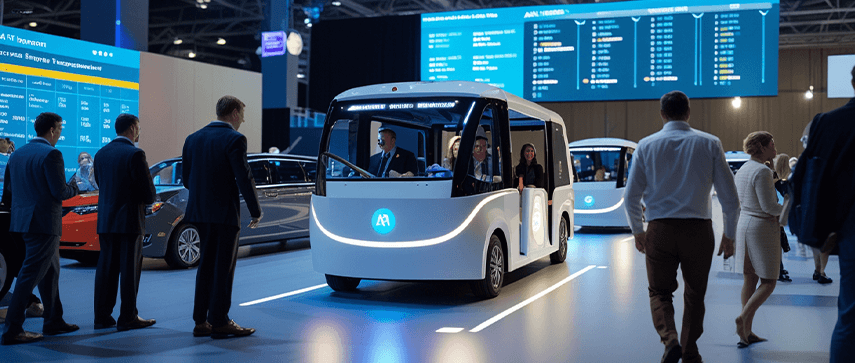
AI helps event organizers achieve sustainability by:
- Minimizing Fuel Consumption Through Optimized Routes: Advanced AI algorithms analyze multiple data points to create the most fuel-efficient journeys. The system considers real-time traffic patterns, road gradients, and vehicle specifications to calculate routes that minimize fuel usage. Smart acceleration and deceleration patterns are recommended to drivers through real-time guidance systems, while predictive traffic analysis helps avoid fuel-intensive stop-and-go situations. This event logistics software helps organizers improve VIP transportation management by optimizing routes and reducing environmental impact.
- Promoting Carpooling and Shared Mobility Solutions: Intelligent matching algorithms analyze guest locations, schedules, and preferences to suggest optimal shared ride groupings. The system identifies opportunities for ride-sharing without compromising guest comfort or event timing. Real-time demand prediction enables dynamic shuttle routing that maximizes vehicle occupancy while maintaining service quality. Smart notification systems encourage guests to opt for shared transportation, helping them reduce their carbon footprint with corporate mobility solutions that optimize shared rides.
- Leveraging Data Analytics to Reduce Carbon Footprints: Comprehensive monitoring and analysis of transportation operations provide detailed environmental impact metrics. The AI system tracks and reports carbon emissions in real-time, enabling immediate adjustments to reduce environmental impact. Machine learning models identify patterns in usage data to suggest operational improvements that balance sustainability with service quality, ensuring event transportation solutions remain eco-friendly.
- Smart Fleet Management: AI-powered fleet management systems optimize the deployment of electric and hybrid vehicles based on journey requirements. The platform efficiently manages charging schedules, maximizing the use of renewable energy sources when available. Predictive analytics help plan the gradual transition to more sustainable vehicle options, ensuring long-term viability of VIP transportation services.
- Resource Optimization: Advanced AI algorithms minimize waste in all aspects of transportation operations. From optimal vehicle utilization to paperless documentation, the system identifies and eliminates inefficiencies that impact environmental sustainability. Real-time monitoring ensures resources are used only when needed, reducing unnecessary energy consumption, ensuring event logistics software supports sustainability.
- Environmental Impact Reporting: The AI system generates detailed sustainability reports that help organizations track their progress toward environmental goals. These reports include metrics on fuel savings, emissions reductions, and resource conservation, providing valuable data for environmental compliance and corporate sustainability initiatives. This integration is enhanced by luxury transportation management software, ensuring accurate, real-time reporting on environmental impact.
Through these integrated approaches, AI technology transforms sustainable transportation from an aspirational goal into a practical, measurable reality for event organizers. AI-powered mobility solutions for events make sustainability achievable while improving overall service delivery.
Key Benefits for Stakeholders
For Event Organizers:
- Streamlined Operations and Reduced Costs: AI automation eliminates manual coordination tasks and reduces human error in scheduling and dispatch. The system optimizes resource allocation in real-time, minimizing unnecessary vehicle deployments and idle time. Advanced analytics provide clear visibility into operational costs, helping identify areas for efficiency improvements while maintaining high service quality. Event logistics software powered by AI ensures smooth operations, reducing overhead and operational delays.
- Real-time Insights for Better Decision-Making: Comprehensive dashboards provide instant access to critical operational metrics and performance indicators. The AI system generates automated alerts for potential issues, enabling proactive problem-solving before situations escalate. Historical data analysis helps in planning future events with greater accuracy and efficiency, making AI-powered event management software a critical tool for planners.
- Improved Attendee Satisfaction Leading to Repeat Participation: Consistent, high-quality transportation services enhance the overall event experience. The system maintains detailed feedback and preference data, enabling continuous service improvement. Real-time communication channels ensure guests stay informed and confident about their VIP transportation services, leading to repeat participation and stronger event loyalty.
For Attendees:
- Hassle-free Transportation with Minimal Delays: Smart routing algorithms and real-time traffic monitoring ensure optimal journey times. The system automatically adjusts to schedule changes and provides instant updates through mobile apps, ensuring a seamless experience. The integration with event schedules ensures guests arrive on time, refreshed, and stress-free, making transportation a breeze at any event.
- Personalized Experiences Enhancing Convenience: AI-powered platforms remember individual preferences and automatically apply them to future bookings. The system offers customized route suggestions and vehicle options based on guest profiles. Mobile applications provide intuitive interfaces for managing transportation requests and receiving updates, ensuring that all guests have a tailored experience for event transportation services.
- Environmentally Conscious Mobility Options: Clear visibility into the environmental impact of different transportation choices. The system suggests eco-friendly alternatives when available, such as electric vehicles or shared rides. Real-time carbon footprint tracking allows environmentally conscious guests to make informed decisions while enjoying sustainable transportation solutions.
For Transportation Providers:
- Increased Operational Efficiency and Profitability: AI optimization reduces empty vehicle movements and improves fleet utilization rates. Automated scheduling and dispatch eliminate manual coordination overhead. The system provides detailed analytics on service performance and cost metrics, enabling data-driven business decisions and increased profitability for transportation providers.
- Predictive Insights for Maintenance and Resource Planning: Advanced analytics forecast maintenance needs before they become critical issues. The system optimizes vehicle maintenance schedules to minimize service disruptions. Resource planning becomes more accurate with AI-driven demand prediction and trend analysis, ensuring maximum operational uptime.
- Opportunities to Adopt Cutting-edge Technology for Competitive Advantage: Integration with emerging technologies keeps service offerings current and competitive. The platform enables rapid deployment of new features and service enhancements. Providers can offer innovative services such as autonomous vehicles and sustainable transport options, providing a unique edge in the marketplace.
For Event Venues:
- Enhanced Venue Management: Seamless integration with venue systems improves access control and security management. The AI system coordinates arrivals and departures to prevent congestion at venue entry points. Real-time communication with transportation providers helps manage unexpected situations, optimizing traffic flow and improving event guest experiences.
- Improved Security Coordination: Advanced tracking and monitoring capabilities enhance venue security operations. The system maintains detailed logs of all vehicle movements and guest arrivals. Integration with venue security systems ensures coordinated response to any incidents, enhancing overall event safety and security.
What Lies Ahead?
The future of event transportation with AI is promising, with several groundbreaking innovations poised to transform the industry:
Advanced Aerial Mobility Solutions:
- AI-enabled drones and eVTOLs (electric vertical takeoff and landing vehicles) are emerging as potential solutions for VIP transfers. These systems will integrate with existing ground transportation networks to provide seamless multi-modal journeys. AI algorithms will manage flight paths, weather conditions, and safety parameters while maintaining the luxury experience expected by VIP clients.
Digital Twin Technology:
- Digital twins will revolutionize event transportation planning by creating virtual replicas of entire transportation networks. Event organizers can simulate various scenarios and test different strategies before implementation. These digital environments will enable real-time optimization of routes, resources, and schedules by processing massive amounts of data from connected vehicles and infrastructure.
Blockchain Integration:
- Blockchain technology will enhance security and transparency across the transportation ecosystem. Smart contracts will automate service agreements and payments while ensuring data integrity. The technology will enable secure sharing of sensitive guest information while maintaining privacy protocols, ensuring seamless transactions in event transportation services.
Enhanced AI Capabilities:
- Next-generation AI systems will offer deeper insights and more sophisticated decision-making capabilities. Machine learning algorithms will become more adept at predicting and responding to complex scenarios. Natural language processing will enable more intuitive interaction between guests and transportation systems, enhancing user engagement and experience.
Sustainable Innovation:
- Future developments will focus heavily on sustainable transportation solutions. Integration of renewable energy sources and zero-emission vehicles will become standard. AI systems will optimize environmental impact while maintaining service quality, helping event organizers meet sustainability goals with eco-friendly transportation options.
Connected Infrastructure:
- The evolution of smart cities will create new opportunities for integrated transportation solutions. Vehicle-to-infrastructure communication will enable more efficient traffic management. Real-time data exchange between various systems will create seamless guest experiences, further enhancing the appeal of AI-powered event management solutions.
Autonomous Systems Evolution:
- The continued development of autonomous vehicle technology will transform service delivery models. AI-driven vehicles will become more sophisticated in handling complex event scenarios. Integration of autonomous systems with traditional services will create hybrid solutions tailored to specific event needs, offering unique benefits in event transportation logistics.
Event organizers must adopt AI to stay ahead, enhancing their operational efficiency and delivering world-class mobility experiences. The integration of these emerging technologies will not only improve service quality but also create new possibilities for guest experience enhancement.
Looking Ahead:
The successful implementation of these innovations will require:
- Continuous investment in technological infrastructure
- Development of new skills and capabilities
- Adaptation to evolving regulatory frameworks
- Focus on cybersecurity and data protection
- Commitment to sustainable practices
At Mobisoft Infotech, we are committed to empowering the events industry with cutting-edge AI solutions. Our expertise in transportation automation ensures your events run smoothly, leaving no room for errors. Ready to transform your event transportation? Let’s build the future together! Contact us today.


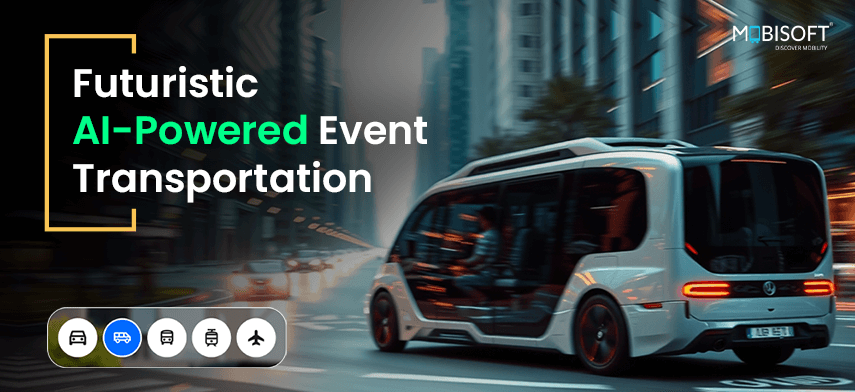


 January 1, 2025
January 1, 2025


